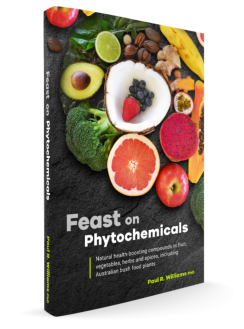Eating a wide range of plants is central to long-term health
This site promotes the appreciation of the health benefits of plant compounds called phytochemicals, found in fruit, vegetables, herbs and spices, including Australian bush food plants.

What are Phytochemicals?
Phytochemicals are compounds made by plants. Phyto refers to plants, so that the word phytochemicals means plant chemicals. Phytochemicals are also known as phytonutrients. They are made by plants to attract flower pollinators and seed dispersers, to cope with extremes of weather, as antimicrobial compounds and to deter insects from eating their leaves. The sophisticated chemistry that plants use to thrive provides compounds that are vital to our long-term health.
Where to find them.
Phytochemicals supply the brilliant flavours and smells of fruit, vegetables, herbs and spices. They provide the pungent smell of garlic, the intense colour of blueberries, the zing of ginger and the heat of chillies. They include caffeine in coffee, carotenoids in carrots, curcumin in turmeric, gingerol in ginger and resveratrol in grapes and red wine. The cool sensation we feel when eating mint, and the heat from chillies, are due to phytochemicals in those plants stimulating receptors in our mouths.

What are they good for?
Phytochemicals contribute important medicines, such as morphine. They are also important to our long-term health because they provide us with antioxidant and antiinflammatory benefits. They can contribute to weight loss, promote detox and help maintain eye health. Phytochemicals also help stimulate our minds, balance cholesterol and lower blood pressure. As a result of these actions, phytochemicals help reduce the chance of developing, or lower the severity of, many diseases such as arthritis, cardiovascular disease, some cancers, cataracts, dementia and depression.
Buy the Book
$30.00 + P&H
This book brings the science of plant compounds to people interested in healthy eating and nutrition. It interprets the latest scientific research about health promoting phytochemicals that are supplied to us in common fruit and vegetables (including nuts, legumes and whole grains), herbs and spice.


